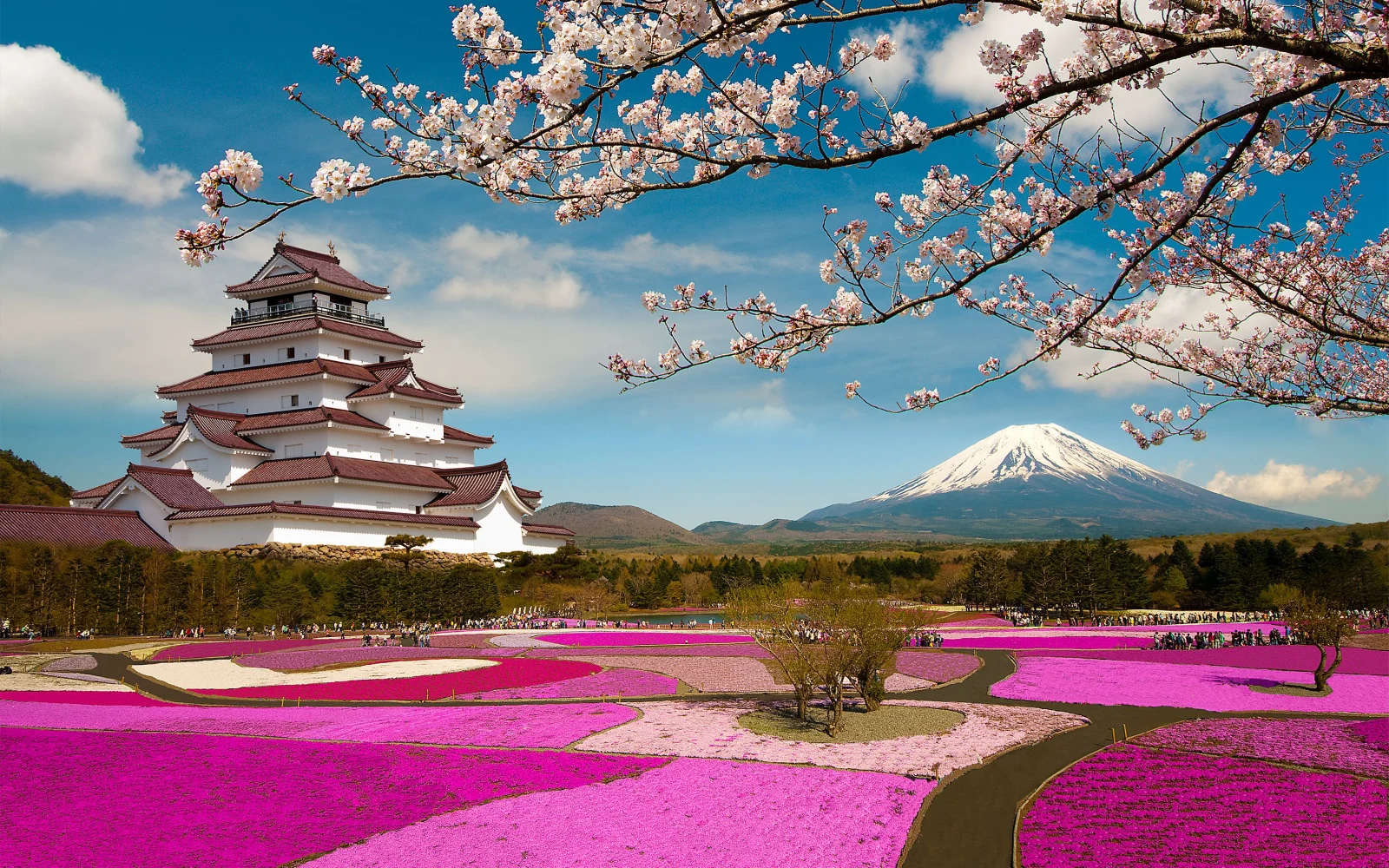Japan doesn’t need an introduction to tell you why you should visit — almost 32 million people visited in 2019.
There are many sights in Japan to keep these tourists interested, from famous Mount Fuji to the historic buildings and shrines of Kyoto. Getting to experience Japanese culture with its blend of traditional and modern is also a fascinating experience.
Check out the pulsing nightlife and alternative subcultures of the capital city, Tokyo, or head into the countryside for a stay at a traditional onsen or hot spring spa.
But while there’s enough to see to keep even the busiest tourist entertained, is Japan safe to visit? Here’s our take.
Is Japan Safe to Visit in 2026?
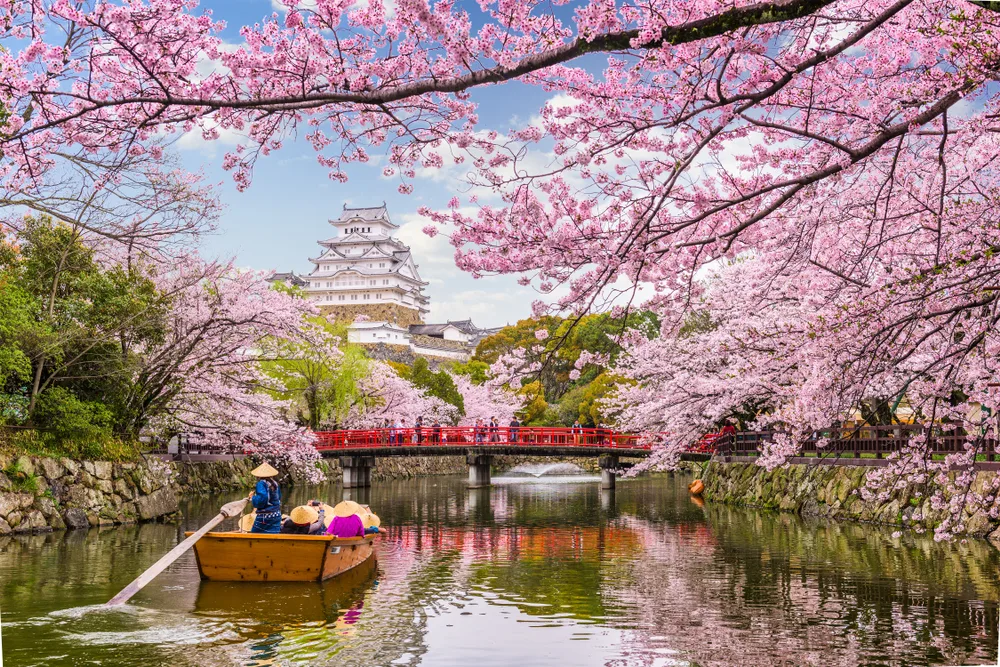
Sean Pavone/Shutterstock
Yes. Japan is extremely safe, and is often called on of the safest countries in the world. It has a very low crime rate and almost no other factors that might affect your trip, such as political unrest.
Although the country is prone to natural disasters, it has excellent infrastructure in place to rescue and take care of any people affected by disasters. Japan is one of the safest countries in the world.
According to the Global Peace Index, Japan ranks #10 in the world in terms of safety and security. This index ranks countries according to three factors: militarization, safety and security, and ongoing domestic and international conflicts.
International travel advisories are also unified in their evaluation of Japan as a safe place to visit. The United States only tells citizens to exercise normal precautions when visiting Japan, the lowest possible travel advisory.
Most other countries also give travelers the green light to visit Japan. Like any place in the world, Japan does have crime.
Common crimes include:
- Pickpocketing
- Bag snatching
- Sexual harassment
- Fraud
- Drink spiking
- Assault
As you can see from the list, most crime incidents that occur in Japan are petty in nature. Violent incidents such as homicides and armed robberies do occur, but they rarely affect foreigners.
Perhaps the most famous violent crime in Japan in recent years was the assassination of Shinzo Abe, the former prime minister. However, this was an extremely rare incident of political violence in Japan.
Demonstrations, when they happen, are largely peaceful, although you should avoid them anyway if you run into one to avoid getting caught up in something unpleasant.
The biggest concern for tourists visiting Japan is probably the possibility of a natural disaster. Japan is on the Ring of Fire, an active seismic zone in the Pacific Ocean. The UK government lists natural disasters that Japan is prone to, including earthquakes, tsunamis, and volcanic eruptions.
Before visiting Japan, download the NHK World app, an English-language disaster alert application from the Japanese government, and research basic disaster preparedness.
The deadliest natural disasters to hit Japan in recent years were the Great Sendai Earthquake of 2011 and the subsequent tsunami. About 19,300 people perished due to the disaster.
The earthquake also damaged the Fukushima Daiichi nuclear power plant, causing a serious leak of radioactive material. There are still some restricted areas around the plant due to the risk of radiation.
Crime in Japan
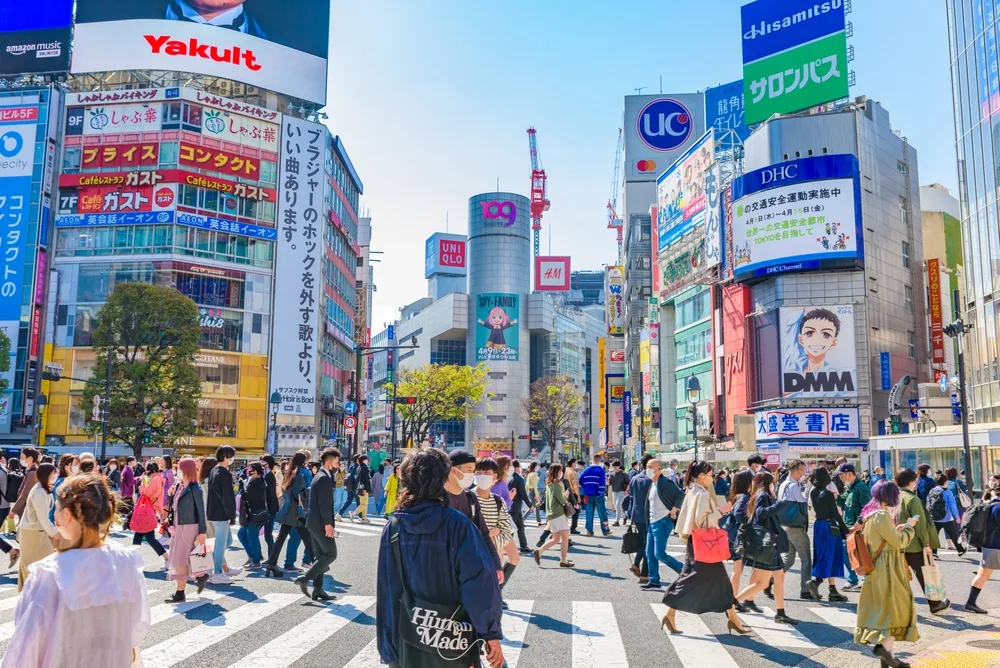
TOKYO, JAPAN – APR 8, 2022: View of Shibuya Crossing, one of the busiest crosswalks in the world/Takashi Images/Shutterstock
Most people are concerned about crime when they go abroad. However, Japan is an exception to this cause for concern. Japan has some of the lowest crime rates in the world, and residents and visitors alike are rarely troubled by crime.
Japan has one of the lowest violent crime rates in the world. In 2020, the homicide rate was 0.25 incidents per 100,000 people. When homicides do happen, they usually make national news and horrify the nation.
The overall incidence of crime is very low. In 2021, the Japanese police only registered 452.7 incidents of crime per 100,000 people, one of the lowest rates in the world.
The vast majority of these crimes were petty crimes, such as pickpocketing and disorderly conduct. There are a few reasons why Japan has such a low crime rate. Japan has low rates of social factors that often cause crime, such as drug abuse, unemployment, and income inequality.
Firearm ownership is practically nonexistent. However, some analysts point to troubling reasons, including a harsh criminal justice system with few rights for suspects, who can even be tortured.
In early 2023, Japanese news and the public panicked after the Japanese police released crime statistics in 2022. For the first time in decades, Japan’s crime rate increased compared to previous years by 5.9%.
The crimes that increased the most included domestic violence, child abuse, bicycle theft, and other forms of street crime, as well as more violent crimes such as murder. Public perception of safety declined by 10%.
However, it’s important to put these seemingly dire incidents in context.
Public perception of safety probably declined due to the prevalence of high-profile incidents in 2022, such as the assassination of Shinzo Abe and several stabbings in Tokyo, not due to the numerical proliferation of crime.
Other analysts pointed out that the crime rate only increased when compared to the previous year. Japan was under strict coronavirus lockdowns in 2020 and 2021 and eased restrictions in 2022, which would lead to a comparative “spike” in crime compared to when everyone was at home.
The supposed dramatic rise in crime in Japan in 2022 was just crime returning to normal pre-pandemic levels. Even with the rise in crime, Japan still has one of the lowest crime rates in the world.
Petty Theft
Japan has a very low crime rate, but crime is still present. Pickpocketing and other forms of petty theft are pretty much omnipresent in this world, and Japan is no different.
The Australian government warns its citizens that pickpockets in Japan often target popular tourist attractions. They know these are places that attract foreigners, who make easy (and lucrative) targets for pickpocketing.
Pickpocketing is most common in bigger cities such as Tokyo and Osaka. In Tokyo, they often operate in popular neighborhoods with busy nightlife districts such as Shinjuku and Shibuya.
Public transportation and transit hubs are also common locations for criminals engaged in petty theft. Train stations are popular locations for pickpockets, especially since there will often be people sleeping off their night on the town waiting for the first train home.
Tokyo’s trains and subway cars are famously crowded, making them very attractive locations for pickpockets. Be careful of people bumping against you as you move around town.
Some bumping is inevitable since the crowds are so thick, but stay alert if someone seems to be doing it deliberately. Be careful about other distraction tactics, such as someone spilling something on you (although this one is rarer in conflict-averse Japan).
The same basic precautions that you should take against pickpockets anywhere you go can protect you in Japan.
Make sure that you keep your valuables in a safe place, such as your front pocket or a zipped cross-body bag (if you do carry a tote bag or open bag, follow the lead of some Japanese women and use a scarf or towel to cover the contents).
Finally, don’t leave your bag unattended, for example, when going to the restroom in a restaurant.
Drink Spiking
Unfortunately, Japan has a serious problem with drink spiking in bars and nightclubs, so much so that many countries single it out in their travel advisories to their own citizens as a cause of concern.
The Canadian government warns about the prevalence of drink spiking in nightclubs, particularly in Tokyo. Usually, drink spiking is a prelude to another form of crime.
The perpetrator takes advantage of the victim to rob them or to commit credit card fraud. There have been incidents of tourists waking up discombobulated in a nightclub just to discover that they were billed exorbitant amounts for unknown services while asleep.
In more serious cases, female travelers were sexually assaulted while they were unconscious. Criminals spike drinks by adding date rape drugs or excessive alcohol to mixed drinks.
Perpetrators can be posing as fellow clubgoers or employees of the bar themselves. Be careful in Tokyo’s nightlife districts, such as Shinjuku and Ikebukuro, and particularly in the red light districts of Kabuki-cho and Roppongi.
Avoid going into nightclubs that have aggressive touts working in front to convince people to go there, as these are often connected with shady dealings. If you are the victim of a drink spiking, file a police report.
If you were robbed or defrauded, the police report could help you get your money back. An initial police report is also helpful if you discover later that you were the victim of a more serious crime while you were unconscious.
Avoiding Bad Areas
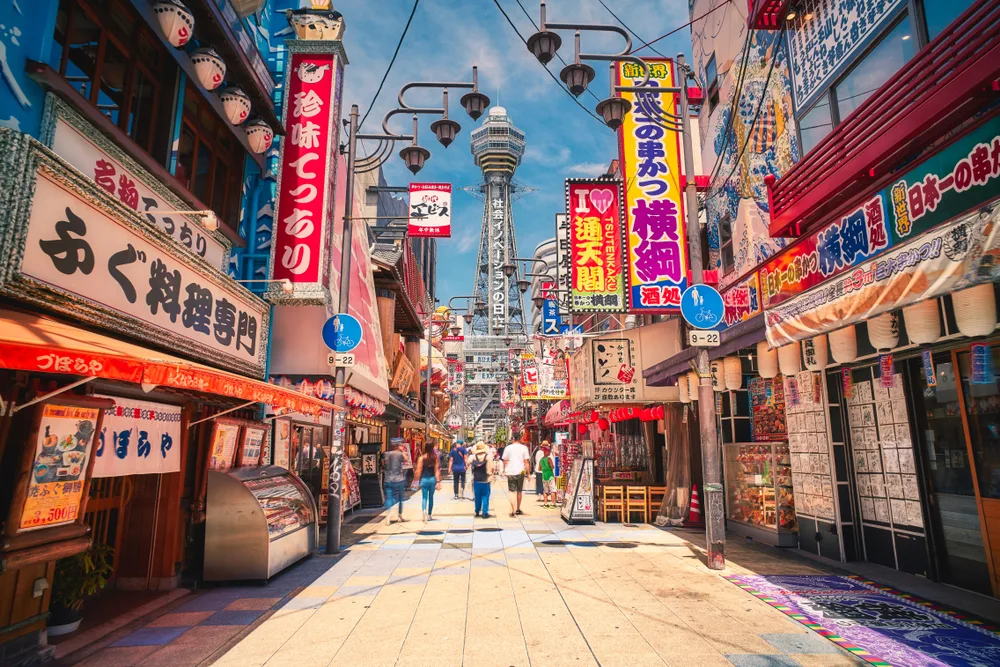
Osaka, Japan – July 22, 2018: Tsutenkaku tower is a famous landmark of Osaka, Japan and advertises Hitachi in Shinsekai district (New world) of Naniwa ward, Osaka, Japan/Yusheng Hsu/Shutterstock
Japan has few areas that would be considered “bad” in other countries, but it is still helpful to be aware. In Tokyo, be careful in the prominent nightlife districts, especially Roppongi and Kabuki-cho.
These are the hotspots for drink spiking as well as theft. Be careful in crowded areas such as train stations, the airport, and subways. Osaka is another city with elevated crime rates compared to the rest of the country.
Be careful in neighborhoods such as Kamagasaki and Shinsekai. Don’t go to the area around Fukushima, as some parts are still restricted due to nuclear contamination.
Things to Consider
Here are some other safety tips while in Japan:
- Japan is a popular winter sports destination, but be careful when backcountry skiing due to avalanches.
- Sexual harassment and inappropriate touching are, unfortunately, common, especially in the subways. Try to go to women-only cars if possible.
- Japan is close to the Korean Peninsula and sometimes affected by escalating tensions between North and South Korea. Read government alerts carefully and follow instructions in case there is an advisory.
- Japanese drug laws are strict, so don’t indulge in illegal substances while you are there (or even a few weeks before your trip, as you might get in trouble if residual substances are found when you are randomly drug tested).
Frequently Asked Questions
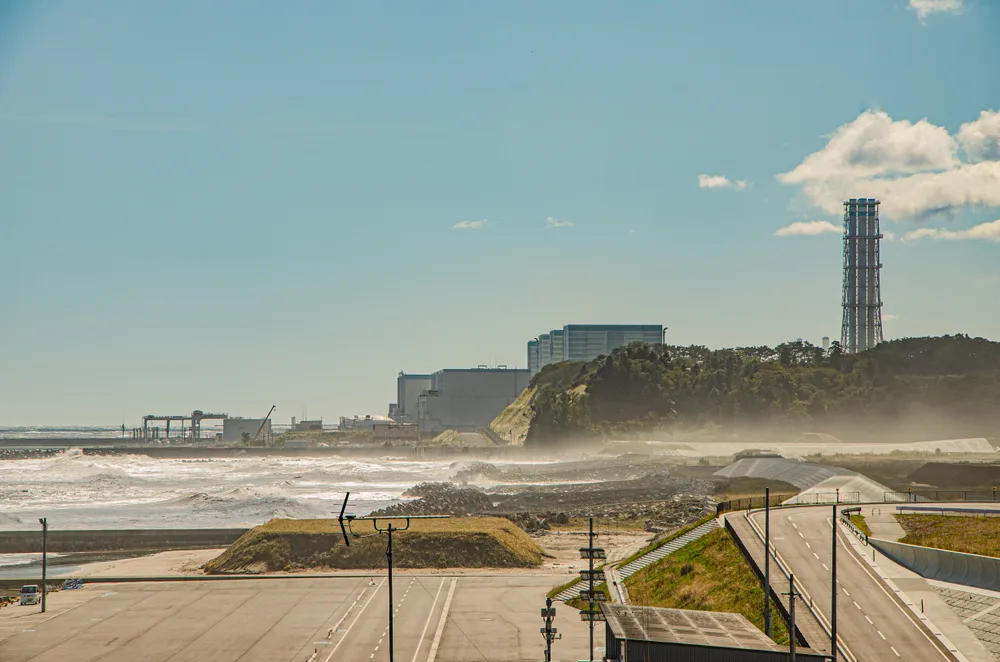
Santiherllor/Shutterstock
Here are some other questions fellow travelers to Japan wanted to ask:
Is it safe to travel to Japan due to radiation?
Many people are worried about traveling to Japan after the Fukushima disaster and considering Japan is the only country to have an atomic bomb dropped on it during war.
However, radiation levels in most of Japan are normal background radiation levels. Only certain areas of Fukushima which are off-limits to civilians have high levels of radiation.
How safe is Japan for female tourists?
Japan is mostly safe for female tourists, but many women in Japan have had negative experiences with inappropriate touching in public places. Don’t be afraid to shout at the perpetrator and attract attention or move to a safer area if anything happens.
Is it expensive to visit Japan?
Japan is an expensive country to visit as the cost of everything, from food to accommodation, is fairly high. You can travel on a mid-range budget if you do some advance planning.
Is it rude not to finish your food in Japan?
Before visiting Japan, you should read up on cultural norms. One of those is that you should finish all the food on your plate, especially when you are a guest in someone’s house. That signals that you enjoyed your meal and that you will not waste anything.
How safe is Tokyo for tourists?
Tokyo is very safe for tourists as long as you have some situational awareness while walking around. It has an elevated crime rate — but by Japanese standards.
So, Is Japan Safe to Visit?
Japan is one of the safest countries in the world you could visit, thanks to its low crime rate, but it is not without its problems. You should still be alert when you are out and about in Japan, especially in crowded areas and in nightlife districts.
So, with so much to see and do, what are you waiting for — book your trip today!



